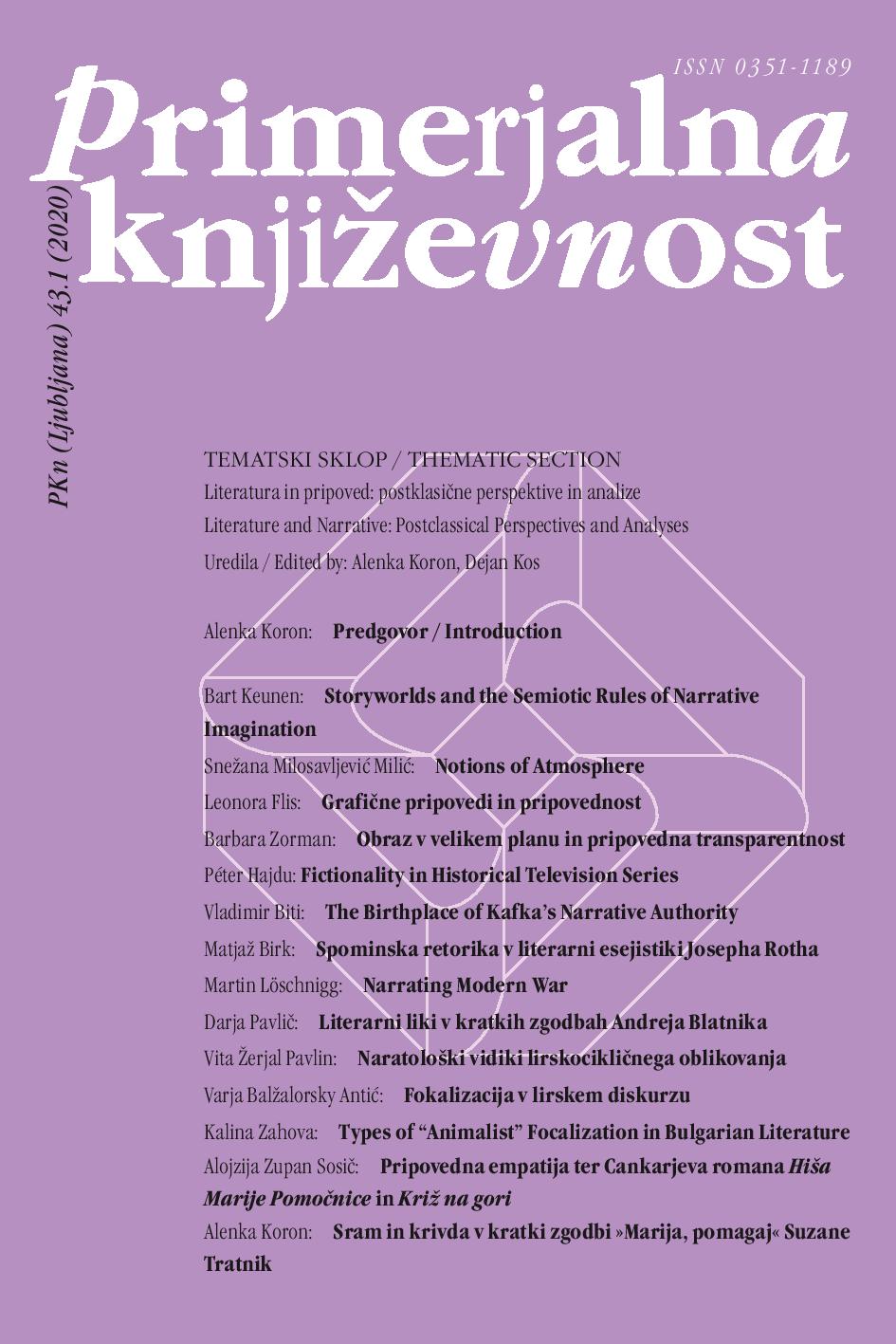Shame and Guilt in the Short Story “Saint Mary, Help!” by Suzana Tratnik
DOI:
https://doi.org/10.3986/pkn.v43.i1.14Keywords:
narratology, Breger, Claudia, narrative worldmaking, Slovenian literature, short story, Tratnik, Suzana, narrative technique, emotions, affects, shame, guiltAbstract
Affects and emotions have been recognized as an essential part of literary experience since Antiquity, but they were excluded from the consideration of narrative literature during the dominance of structuralism. An explicit interest in them has only emerged in narratological discourses in recent decades with the emerging paradigm of contemporary affect studies. Various influences have played a role in this, including the tradition of poetics, rhetoric and psychoanalysis, recent neuroscientific, cognitive and evolutionary approaches to narrative, as well as feminist narratology, queer theoretical conceptualizations of feelings, and more recently Deleuzian conceptions of affect. In this article, I draw on a syncretic model of narrative worldmaking developed by Claudia Breger in a dialogue with the influences listed, and taking into account Paul Ricoeur and Bruno Latour. In my reading of the short story “Saint Mary, Help!” from No Voices (2016) by contemporary writer and lesbian activist Suzana Tratnik, I try to probe the narrative productivity of shame and guilt as social affects in the process of narrative worldmaking, and shed light on the type of reader engagement her discourse invites.
References
Breger, Claudia. »Affect and Narratology«. The Palgrave Handbook of Affect Studies and Textual Criticism. Ur. Donald R. Wehrs in Thomas Blake. Cham: Palgrave Macmillan, 2017. 235–257.
Breger, Claudia. »Affects in Configuration: A New Approach to Narrative Worldmaking«. Narrative 25.2 (2017): 227–251.
Copjec, Joan. »The Object-Gaze: Shame, Hejab, Cinema«. Filozofski vestnik 27.2 (2006): 11–29.
Flesch, William. Comeuppance: Costly Signaling, Altruistic Punishment, and Other Biological Components of Fiction. Cambridge, MA: Harvard University Press, 2007.
Hofman, Ana. Glasba, politika, afekt: Novo življenje partizanskih pesmi v Sloveniji. Ljubljana: Založba ZRC, ZRC SAZU, 2015.
Hogan, Patrick Colm. Affective Narratology: The Emotional Structure of Stories. Lincoln in London: University of Nebraska Press, 2011.
Keen, Suzanne. Empathy and the Novel. New York: Oxford University Press, 2007.
Koron, Alenka. »Pripovedni prostor v ‘Idini kocki’ Suzane Tratnik«. Prostori slovenske književnosti. Ur. Marko Juvan. Ljubljana: Založba ZRC, ZRC SAZU, 2016. 299–311.
Kosofsky Sedgwick, Eve. Dotik občutka: Afekt, pedagogika, performativnost. Prev. Tanja Velagić. Ljubljana: Zavod Emanat, 2007.
Kosofsky Sedgwick, Eve, in Adam Frank (ur.). Shame and Its Sisters: A Silvan Tomkins Reader. Durham in London: Duke University Press, 1995.
Milosavljević Milić, Snežana. Virtuelni narativ: Ogledi iz kognitivne naratologije. Niš, Novi Sad in Sremski Karlovci: Izdavačka knjižarnica Zorana Stojanovića, 2016.
Phelan, James. Experiencing Fiction: Judgments, Progression and the Rhetorical Theory of Narrative. Columbus: Ohio State University Press, 2007.
Sasso, Robert, in Arnaud Villani (ur.). Le vocabulaire de Gilles Deleuze. Nica: Centre de Recherches d’Histoire des Idées, 2003.
Tratnik, Suzana. »Marija, pomagaj«. Noben glas. Ljubljana: Beletrina, 2016. 25–41.
Walsh, Richard. The Rhetoric of Fictionality: Narrative Theory and the Idea of Fiction. Columbus: Ohio State University Press, 2007.
Warhol, Robyn. Having a Good Cry: Effeminate Feelings and Pop-Culture Forms. Columbus: Ohio State University Press, 2003.


